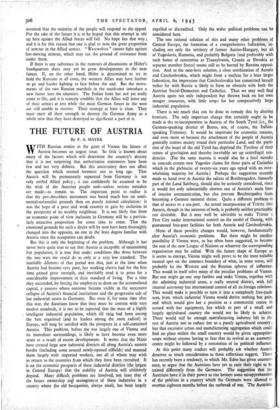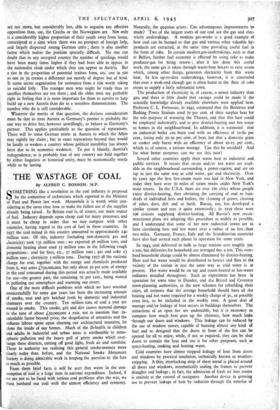THE FUTURE OF AUSTRIA
By F. A. HAYEK
WITI-I Russian armies at the gates of Vienna the future of Austria becomes an urgent issue. So little is known about many of the factors which will determine the country's destiny that it is not surprising that authoritative statements have been few and not very definite. But this uncertainty does not affect the question which seemed foremost not so long ago. That Austria will be permanently separated from Germany is not only settled Allied policy ; it can confidently be assumed to be the wish of the Austrian people and—unless serious mistakes are made—to remain so. The important point to realise is that the pro-Anschluss movement was based much less on senti- mental-nationalist grounds than on purely rational calculation : it was the hope of a poor and weak country to gain by inclusion in the prosperity of its wealthy neighbour. It is not likely that from an economic point of view inclusion in Germany will be a particu- larly attractive proposition for some time to come. That the emotional grounds for such a desire will by now have been thoroughly changed into the opposite, no one in the least degree familiar with Austria since the occupation can doubt.
But this is only the beginning of the problem. Although it has never been quite true to say that Austria is incapable of maintaining her population, it is true that under conditions like those between the two wars she could do so only at a very low standard. The insoluble dilemma of that period was that, just at the time when Austria had become very poor, her working classes had for the first time gained great strength, and inevitably used it to press for a considerable improvement of their standard of living. For a time they succeeded, by forcing the employers to draw on the accumulated capital, a process whose outcome became visible in the successive collapse of Austria's financial institutions and the progressive sale of her industrial assets to Germany. But even if, for some time after this war, the Austrians know that they must be content with very modest standards, it is not to be expected that the mass of a highly intelligent industrial population, which till 1934 had been among the best organised (and its leaders among the most radical). in Europe, will long be satisfied with the prospects in a self-contained Austria. This problem, before the war largely one of Vienna and its immediate surroundings, is likely to have become even more acute as a result of recent developments. It seems that the Nazis have created large new industrial districts all along Austria's eastern border (including some around newly-opened oilfields) and manned them largely with imported workers, not all of whom may wish to return to the countries from which they have been recruited. It is on the economic prospects of these industrial districts (the largest in Central Europe) that the stability of Austria will ultimately depend. Many difficult problems are involved, not least that Of the future ownership .and management of these industries in a country where the old bourgeoisie, always small, has been largely
expelled or discredited. Only the wider political problems can be considered here.
The one rational solution of this and many other problems of Central Europe, the formation of a comprehensive federation, in- cluding not only the territory of former Austro-Hungary, but all of Yugoslavia, Rumania, and probably Bulgaria (and preferably with such bones of contention as Transylvania, Croatia or Slovakia as separate member States) seems still to be barred by Russian opposi- tion. And to the next-best solution, a close combination of Austria and Czechoslovakia, which might form a nucleus for a later larger federation, the impression that Czechoslovakia has committed herself rather far with Russia is likely to form an obstacle with both the Austrian Social-Democrats and Catholics. Thus we may well fmd Austria again not only independent but thrown back on her own meagre resources, with little scope for her comparatively large industrial population.
There is not much that can be done to remedy this by altering frontiers. The only important change that certainly ought to be made is the re-incorporation in Austria of the South Tyrol (i.e., the German-speaking district of Bozen, not, of course, the Italian- speaking Trentino). It would be important for economic reasons, and even more so because the attachment of the people of Austria generally centres mainly round their particular Land, and the parti- tion of the heart of the old Tyrol has deprived the Tyrolese of their centre of gravitation and thereby inevitably set up centrifugal ten- dencies. (For the same reasons it would also be a fatal mistake to concede certain new Yugoslav claims for those parts of Carinthia which in the plebiscite of twenty-six years ago opted with an over- whelming majority for Austria.) Perhaps the suggestion recently made to hand over to Austria the salient of Berchtesgaden, formerly part of the Land Salzburg, should also be seriously considered, since it would not only substantially shorten one of Austria's main lines of interior communicatio.n, but also prevent Berchtesgaden from becoming a German national shrine. Quite a different problem•is that of access to a sea-port. An actual incorporation of Trieste into Austria, though in the interests of both, is probably neither practicable nor desirable. But it may well be advisable to make Trieste a Free City under international control on the model of Danzig, with guaranteed free-port facilities for both Austria and Czechoslovakia.
.None of these possible changes would, however, fundamentally alter Austria's economic problems. But there might be another possibility if Vienna were, as has often been suggested, to become the seat of the new League of Nations or whatever the corresponding organisation may be called. With the. future shape of Europe as it seems to emerge, Vienna might well prove to be the most suitable neutral spot on the common boundary of what, in some sense, will probably be the Western and the Russian spheres of influence. This would in itself solve many of the peculiar problems of Vienna. But one might go one step further and make Vienna, together with the adjoining industrial areas, a really neutral district, with full internal autonomy but international control of all its foreign relations. This would make it possible to turn it into a completely free-trade area, from which industrial Vienna would derive nothing but gain, and Which would give her a' position as a commercial centre in accord with- her equipment, but which as part of a small and largely agricultural country she would not be likely to achieve. There would still be enough manufacturing industry left in the rest of Austria not to reduce her to a purely agricultural country ; but that excessive urban and manufacturing aggregation which could find no place within the small country would be given appropriate scope without anyone having to fear that its revival as an economic centre might be followed by. a restoration of its political influence.
At this point many readers will probably ask whether Austria deserves so much consideration as these reflections suggest. There has recently been a tendency, to which Mr. Eden-has given counten- ance, to argue that the Austrians have yet to earn their right to be treated differently from the Germans. The suggeitiOn that the Austrians have it in their power to rise betrays some misapprehension of the poiition in a country which the Germans were allo%ved to overrun eighteen months before the outbreak of war. The Austrians
are not more, but considerably less, able to organise any effective opposition than, say, the Czechs or the Norwegians are. Not only is a considerably higher proportion of their youth away from home, conscripted at a time when there was no prospect of foreign help, and largely dispersed among German units ; there is also another factor which makes the position specially difficult. No one can doubt that in any occupied country the number of quislings would have been many times higher if they had been able to appear in the nationalist cloak under which they can appear in Austria. But a rise in the proportion of potential traitors from, say, one in soo to one in 5o creates a difference not merely of degree but of kind. It turns secret organisation for resistance from a risk worth taking to suicidal folly. The younger men who might be ready thus to sacrifice themselves are not there ; and the older men are probably right in feeling that it is more important for them to survive to help build up a new Austria than die in a senseless demonstration. The number who do is still considerable.
Whatever the merits of that question, the decisive consideration must be that to treat Austria as Germany's partner is probably the one way to drive her, however unwillingly, to behave as Germany's partner. This applies particularly to the question of reparations. There will be sonic German assets in Austria to which the Allies may rightly lay claim ; but to exact reparations beyond that would be fatally to weaken a country whose political instability has always been due to its economic weakness. To put it bluntly, Austria's independence, as is probably true of any country not held together by either linguistic or historical unity, must be economically worth while to be lasting.



























 Previous page
Previous page